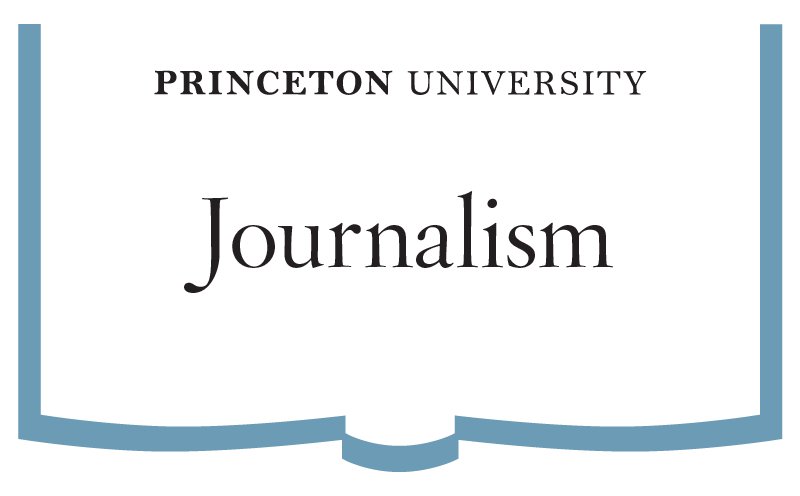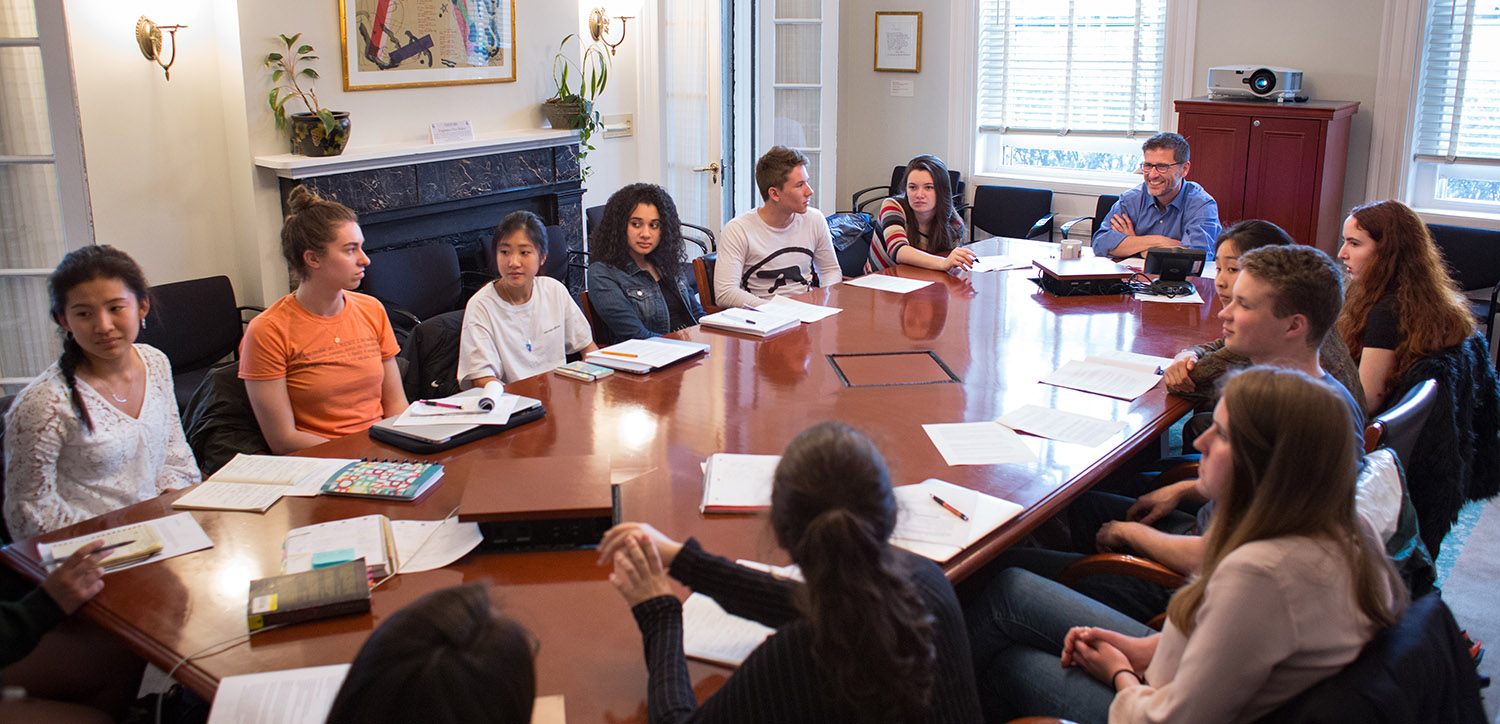In acknowledgement of ever-growing student interest in journalism, the faculty of Princeton University voted unanimously yesterday to offer, for the first time, an undergraduate certificate in journalism.
The move is part of a sweeping overhaul of the University’s storied journalism seminars, aimed at meeting a swelling demand for journalism courses and recognizing the evolution of the rapidly evolving field. It marks the biggest expansion and restructuring of the seminars since they were inaugurated 60 years ago by a bequest from former New York Herald journalist Edwin F. Ferris, Class of 1899.
Esther Schor, Acting Chair of the Humanities Council, notes that, “in an era of relentless attempts to undermine public trust in the press, our new program in journalism will shape the skills and ethics of the next generation of leading journalists, writers, and policy-makers. Our students have been telling us that the impact of journalism courses is life-changing and mind-expanding, and we’ve been listening. We hope more students will realize the gifts of encounter, inquiry, and discovery offered by the study and practice of journalism at Princeton.”
The new program in journalism, which will continue to be housed in the Humanities Council, will preserve the University’s beloved and highly rated journalism courses, while creating a rigorous framework of seminars for students from diverse departments, such as Comparative Literature, Computer Science, Ecology and Evolutionary Biology, English, History, Politics, and the Woodrow Wilson School of Public and International Affairs, among others. A distinctive feature of Princeton’s journalism course offerings has long been the understanding of journalism as a profession rooted in the humanities even as it approaches questions of public policy, national security, economics, data analysis, and social science. The new certificate program seeks to integrate journalism courses within the University by building a vibrant, interdisciplinary community of students, professors, and practitioners.
The program was welcomed by faculty, including Alison Isenberg, professor of History, who looks forward to the guided immersion it will offer students in the practices, meanings, ethics, and implications of writing. “Many of the students I teach in modern U. S. history and in seminars in WWS and Urban Studies bring an interest in journalism to their independent work,” said Isenberg. “History students make extensive use of Princeton’s remarkable historical newspaper databases as core primary sources, and journalism-related courses bring will hands-on, civically-engaged learning into the curriculum.”
An overarching theme of the program’s new gateway seminars will be the primacy of ethics in journalism and a personal commitment to telling the truth without fear, favor, or partisanship. Students will master the art and science of reaching beyond bare facts to ensure that those facts are presented fairly, in context, and with all the shades of gray present in the real world. They will learn the importance of the public’s right to know in a democracy, as well as the importance of an individual’s right to privacy. The program will emphasize the importance of free speech, verified facts, and the power of truth-seeking research in a participatory democracy.
The new certificate program will offer students continuity of instruction, a community of peers, advising on internships and fieldwork, and a capstone experience of presenting their work to faculty and peers. Certificate students will be required to do substantial fieldwork—local, domestic, or international—for which the Council will provide funding, available through awards for internships, summer seminars, and independent journalism projects.
Princeton’s journalism seminars will remain intimate—no more than 16 students—to maximize personal interaction with the world-class journalists who teach students to report and to write. The courses will also continue to feature guest speakers who offer a boots-on-the-ground look at journalistic process, and to include excursions to newsrooms at organizations as diverse as National Public Radio, ProPublica and BuzzFeed.
Students trained in and inspired by Princeton’s journalism seminars have gone on to write for The New Yorker, The New York Times, The Washington Post, and other esteemed publications, and to enjoy successful careers as non-fiction authors. Many students have lit upon their senior thesis topics as a result of their reporting in courses such as “Investigative Journalism,” “International News,” and “Audio Journalism.”
Perhaps the best-known of the seminars is “Creative Non-Fiction,” a legendary course led by John McPhee, a staff writer with The New Yorker and a recipient of the Pulitzer Prize and the Award in Literature from the Academy of Arts and Letters. Joe Stephens, a veteran investigative reporter and the University’s other Ferris Professor of Journalism in Residence, teaches seminars on “The Media in America” and “Investigative Journalism.” Stephens also leads a path-breaking summer course that takes students to Greece to report on the refugee crisis; student work produced in the course has appeared in the international edition of The New York Times, Reuters, and the Religion News Service.
Bernard Haykel, professor of Near Eastern Studies, described the importance of a journalism program for students and faculty do research on regional studies, particularly in areas of the world like the Middle East that are constantly in the news. “Not only do many of our students want to become journalists,” Haykel said, “but studying how the news is covered, produced, and commented on (i.e., the nuts and bolts of journalism) will provide students with a critical understanding of how the Middle East is represented and at times misrepresented.”
Christy Wampole, professor French and Italian, pointed to strong student interest in current events and politics, including Islam and radicalization, sexual harassment, sustainable farming, and France and Italy’s place in the European Union. “Students often take on journalistic research for their junior papers, senior theses, and independent work,” Wampole noted. “A journalism certificate will allow our students to attain the necessary skills to succeed in such projects, and, I believe, to become engaged citizens and stewards of truth.”
As in the past, the seminars will draw on some of the world’s most accomplished journalists as visiting faculty. Past Ferris Professors include many towering figures, such as David Remnick, editor of The New Yorker, and Jill Abramson, former executive editor of The New York Times.
By offering a structured framework to students, the program will seek to
—Attract students earlier in their studies and guide them into individually tailored course plans.
—Quickly identify extraordinary talent in the field and direct it accordingly.
—Nurture a culture in which students can bond and grow, aided by a shared vocabulary and common skills.
—Offer advanced courses to students who understand the basics of reporting and journalistic writing, so that seminars can focus on more complex and specialized questions.
—Increase the opportunity for field experiences, at home and abroad, through which students can not only improve their skills but directly inform the public.
—Track individual development and tailor personal opportunities for study abroad, internships in major newsrooms, and chances to report on local institutions, providing a direct service to the local community.
—Provide a more muscular intellectual framework and prepare students for global encounters and effective community service work.
Year after year, student evaluations have rated journalism seminars among the highest-scoring courses at the University. Registrar data shows that evaluations of journalism offerings exceed the University-wide average, often by more than 25 percent.
In the last 12 academic years, Princeton has offered 123 journalism courses with a total enrollment of 1,498.
For more information about Princeton’s new certificate program in journalism, contact Kathleen Crown, Executive Director of the Humanities Council, at 609-258-4719 or kcrown@princeton.edu.













